学位英语常用动词词组搭配
- 格式:docx
- 大小:91.80 KB
- 文档页数:35
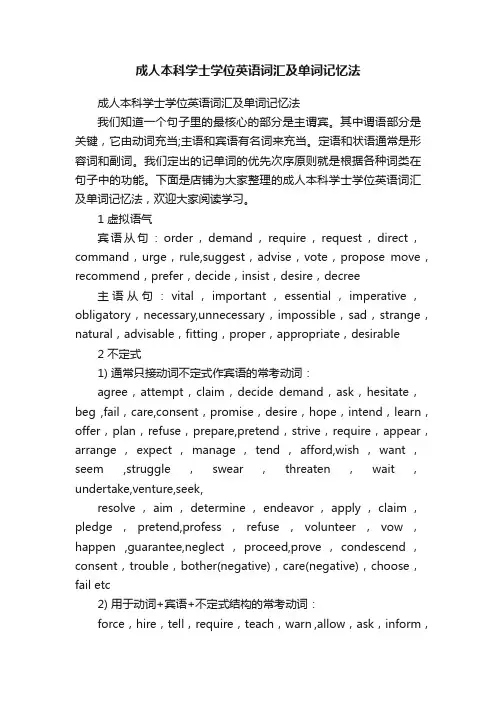
成人本科学士学位英语词汇及单词记忆法成人本科学士学位英语词汇及单词记忆法我们知道一个句子里的最核心的部分是主谓宾。
其中谓语部分是关键,它由动词充当;主语和宾语有名词来充当。
定语和状语通常是形容词和副词。
我们定出的记单词的优先次序原则就是根据各种词类在句子中的功能。
下面是店铺为大家整理的成人本科学士学位英语词汇及单词记忆法,欢迎大家阅读学习。
1 虚拟语气宾语从句:order,demand,require,request,direct,command,urge,rule,suggest,advise,vote,propose move,recommend,prefer,decide,insist,desire,decree主语从句:vital,important,essential,imperative,obligatory,necessary,unnecessary,impossible,sad,strange,natural,advisable,fitting,proper,appropriate,desirable2 不定式1) 通常只接动词不定式作宾语的常考动词:agree,attempt,claim,decide demand,ask,hesitate,beg ,fail,care,consent,promise,desire,hope,intend,learn,offer,plan,refuse,prepare,pretend,strive,require,appear,arrange,expect,manage,tend,afford,wish,want,seem ,struggle,swear,threaten,wait,undertake,venture,seek,resolve,aim,determine,endeavor,apply,claim,pledge,pretend,profess,refuse,volunteer,vow,happen ,guarantee,neglect,proceed,prove,condescend,consent,trouble,bother(negative),care(negative),choose,fail etc2) 用于动词+宾语+不定式结构的常考动词:force,hire,tell,require,teach,warn ,allow,ask,inform,beg,convince,expect,invite,order,permit,promise,instruct,prepare,urge,remind,want,advise,persuade,dare,forbid,like,challenge,request,get,need ,oblige,encourage,enable,compel,recommend,declare,prove,command,encourage,enable,lead,press,etc1) 用于be+形容词+不定式结构的常考形容词anxious,boring,dangerous,pleased,hard,eager,easy,fortunate,strange,good,ready,usual,prepared,surprised,common,useless,asked,lucky,difficult,likely satisfied,careful,sure,glad,bored,certain,etc2) 用于名词+不定式结构的常考名词:failure,offer,plan,ability,decision,desire,chance,permission,occasion,fun,honor,capacity,wish,pleasure,opportunity,demand,way ,refusal,responsibility,freedom,promise,etc.3) 后面跟省去“to”的不定式作宾补的常考动词:see watch,notice,observe,hear,listen to,feel ,get,make,have,let ,help,bid,know,look at ,smell,etc 背单词捷径的第一条每次大量地背。
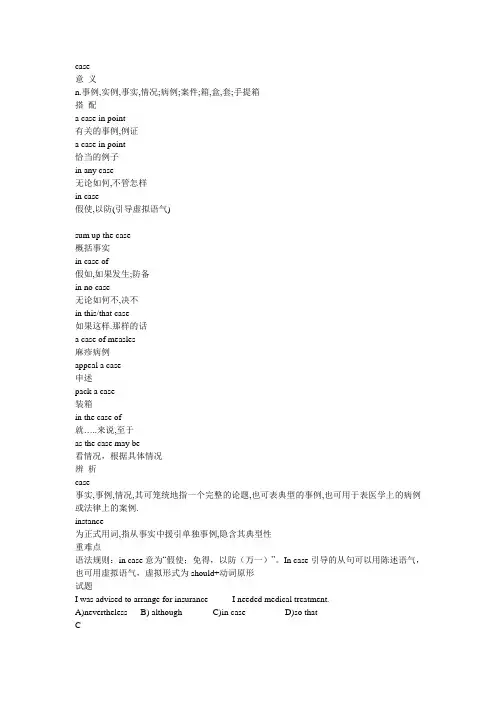
case意义n.事例,实例,事实,情况;病例;案件;箱,盒,套;手提箱搭配a case in point有关的事例,例证a case in point恰当的例子in any case无论如何,不管怎样in case假使,以防(引导虚拟语气)sum up the case概括事实in case of假如,如果发生;防备in no case无论如何不,决不in this/that case如果这样.那样的话a case of measles麻疹病例appeal a case申述pack a case装箱in the case of就…..来说,至于as the case may be看情况,根据具体情况辨析case事实,事例,情况,其可笼统地指一个完整的论题,也可表典型的事例,也可用于表医学上的病例或法律上的案例.instance为正式用词,指从事实中援引单独事例,隐含其典型性重难点语法规则:in case意为“假使;免得,以防(万一)”。
In case引导的从句可以用陈述语气,也可用虚拟语气,虚拟形式为should+动词原形试题I was advised to arrange for insurance _____I needed medical treatment.A)nevertheless B) although C)in case D)so thatCI left for the office earlier than usual this morning _________traffic jam.A)in line with B)for the sake of C)in case of D)at the risk ofCWe left the manager a note________ he wanted to know where we were.A)if B)in case C)so that D)unlessBThe lawyer advised him to drop _________,since he stands little chance to win.A)event B)incident C)case D)affairCraise意义vt.举起、提高、提升;筹集、征集;唤起、引起;养育、饲养、种植;提升,增加(工资)搭配rais e one’s hand举手raise one’s hat to sb.向某人举帽致敬raise doubts in people’s minds引起人们的怀疑raise a child养育孩子raise farm/corps饲养raise funds筹集资金raise salaries增加薪水raise standards of service提高服务水平辨析raise liftraise多指由低处垂直举往高处,不一定费力lift指用力或机械把重物提高到较高的位置rise arise arouse risev.上升arisev.发生arousev.激发起试题Though______in San Francisco, Dave Mitchell had always preferredto record the plain facts of small-town life.答案A)raised B)grown C)developed D)cultivatedAextend意义vt.延伸;扩展、扩大;提供、给予;vi.伸展、延伸;(在范围或应用上)达到构词ex(向外)+tend(伸展)变形extension.n.伸出、伸展;延长部分;电话分机extensivea. 广大的、广阔的;广泛的intensivea.加强的,深入细致的搭配extensive knowledge广博的知识to extend credit/visa延长信贷限期/签证extensive reading泛读extensive discussion广泛的讨论辨析enlargeexpandenlargev.扩大,放大expandv.使膨胀,扩张extend lengthen prolongextend指直线状的伸展,引申指扩大势力、范围。
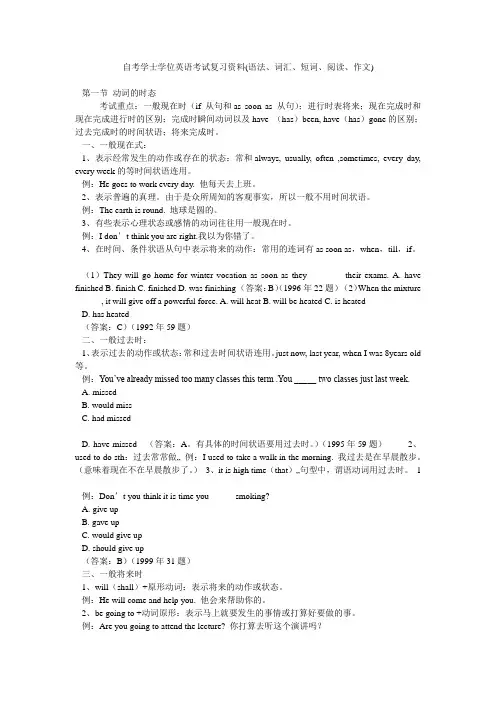
自考学士学位英语考试复习资料(语法、词汇、短词、阅读、作文)第一节动词的时态考试重点:一般现在时(if 从句和as soon as 从句);进行时表将来;现在完成时和现在完成进行时的区别;完成时瞬间动词以及have (has)been, have(has)gone的区别;过去完成时的时间状语;将来完成时。
一、一般现在式:1、表示经常发生的动作或存在的状态:常和always, usually, often ,sometimes, every day, every week的等时间状语连用。
例:He goes to work every day. 他每天去上班。
2、表示普遍的真理。
由于是众所周知的客观事实,所以一般不用时间状语。
例:The earth is round. 地球是圆的。
3、有些表示心理状态或感情的动词往往用一般现在时。
例:I don’t think you are right.我以为你错了。
4、在时间、条件状语从句中表示将来的动作:常用的连词有as soon as,when,till,if。
(1)They will go home for winter vocation as soon as they ________their exams. A. have finished B. finish C. finished D. was finishing (答案:B)(1996年22题)(2)When the mixture ______, it will give off a powerful force. A. will heat B. will be heated C. is heatedD. has heated(答案:C)(1992年59题)二、一般过去时:1、表示过去的动作或状态:常和过去时间状语连用。
just now, last year, when I was 8years old 等。
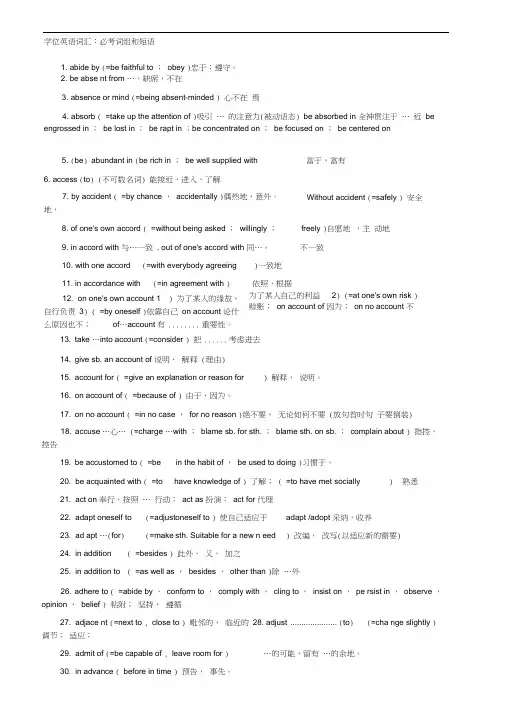
12. on one's own account 1 ) 为了某人的缘故, 自行负责 3) ( =by oneself )依靠自己 on account 论什么原因也不;of …account 有 ........ 重要性。
为了某人自己的利益 2) (=at one's own risk )赊账; on account of 因为; on no account 不13. take …into account (=consider ) 把 ...... 考虑进去 14. give sb. an account of 说明, 解释 (理由) 15. account for ( =give an explanation or reason for ) 解释, 说明。
16. on account of ( =because of ) 由于,因为。
17. on no account ( =in no case , for no reason )绝不要, 无论如何不要 (放句首时句 子要倒装) 18. accuse …心… (=charge …with ; blame sb. for sth. ; blame sth. on sb. ; complain about ) 指控,控告19. be accustomed to ( =be in the habit of , be used to doing )习惯于。
20. be acquainted with ( =tohave knowledge of ) 了解; ( =to have met socially) 熟悉21. act on 奉行,按照 … 行动; act as 扮演; act for 代理 22. adapt oneself to (=adjustoneself to ) 使自己适应于 adapt /adopt 采纳,收养 23. ad apt …(for ) (=make sth. Suitable for a new n eed) 改编, 改写(以适应新的需要)24. in addition( =besides ) 此外, 又, 加之25. in addition to ( =as well as , besides , other than )除 …外26. adhere to ( =abide by , conform to , comply with , cling to , insist on , pe rsist in , observe , opinion , belief ) 粘附; 坚持, 遵循27. adjace nt (=next to , close to ) 毗邻的, 临近的 28. adjust ..................... (to ) (=cha nge slightly )调节; 适应;29. admit of (=be capable of , leave room for ) …的可能,留有 …的余地。
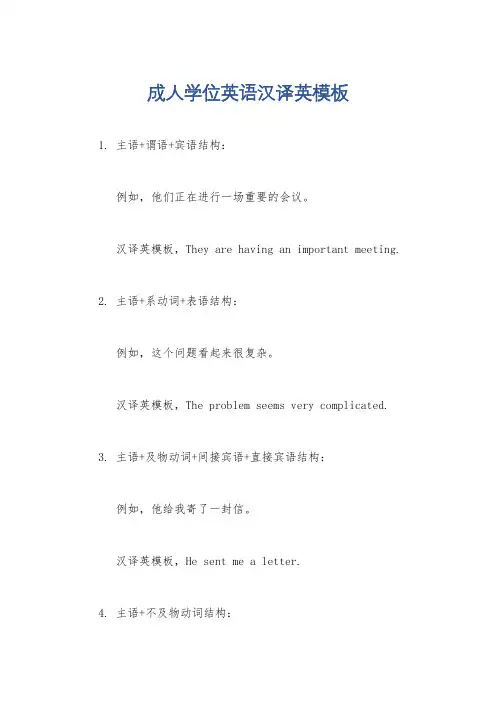
成人学位英语汉译英模板
1. 主语+谓语+宾语结构:
例如,他们正在进行一场重要的会议。
汉译英模板,They are having an important meeting.
2. 主语+系动词+表语结构:
例如,这个问题看起来很复杂。
汉译英模板,The problem seems very complicated. 3. 主语+及物动词+间接宾语+直接宾语结构:
例如,他给我寄了一封信。
汉译英模板,He sent me a letter.
4. 主语+不及物动词结构:
例如,他经常迟到。
汉译英模板,He is often late.
5. 主语+情态动词+动词原形+宾语结构:
例如,我可以帮你。
汉译英模板,I can help you.
6. 主语+动词+副词结构:
例如,她轻轻地关上了门。
汉译英模板,She gently closed the door.
7. 主语+动词+宾语+宾语补足语结构:
例如,我认为她是个好老师。
汉译英模板,I think she is a good teacher.
以上模板可以根据具体句子的语境和结构进行灵活运用,希望对你有所帮助。
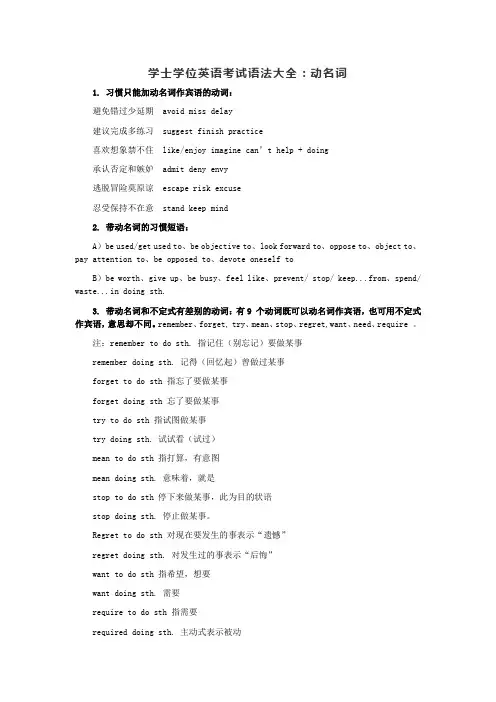
学士学位英语考试语法大全:动名词1. 习惯只能加动名词作宾语的动词:避免错过少延期avoid miss delay建议完成多练习suggest finish practice喜欢想象禁不住like/enjoy imagine can’t help + doing承认否定和嫉妒admit deny envy逃脱冒险莫原谅escape risk excuse忍受保持不在意stand keep mind2. 带动名词的习惯短语:A)be used/get used to、be objective to、look forward to、oppose to、object to、pay attention to、be opposed to、devote oneself toB)be worth、give up、be busy、feel like、prevent/ stop/ keep...from、spend/ waste...in doing sth.3. 带动名词和不定式有差别的动词:有9 个动词既可以动名词作宾语,也可用不定式作宾语,意思却不同。
remember、forget, try、mean、stop、regret,want、need、require 。
注:remember to do sth. 指记住(别忘记)要做某事remember doing sth. 记得(回忆起)曾做过某事forget to do sth 指忘了要做某事forget doing sth 忘了要做某事try to do sth 指试图做某事try doing sth. 试试看(试过)mean to do sth 指打算,有意图mean doing sth. 意味着,就是stop to do sth 停下来做某事,此为目的状语stop doing sth. 停止做某事。
Regret to do sth 对现在要发生的事表示“遗憾”regret doing sth. 对发生过的事表示“后悔”want to do sth 指希望,想要want doing sth. 需要require to do sth 指需要required doing sth. 主动式表示被动。
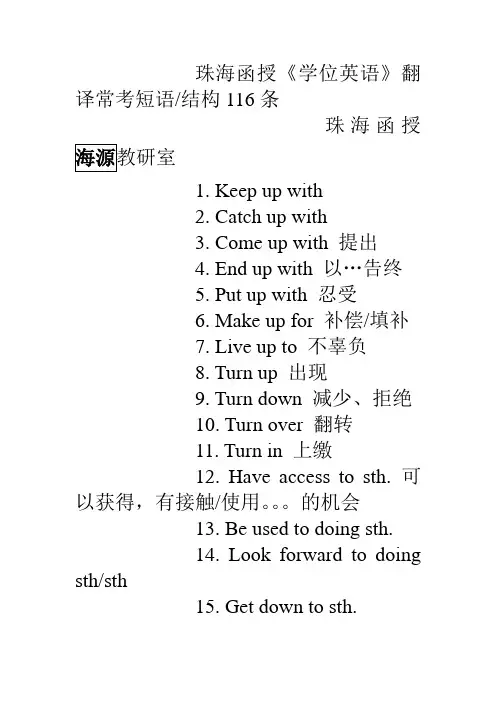
珠海函授《学位英语》翻译常考短语/结构116条珠海函授1. Keep up with2. Catch up with3. Come up with 提出4. End up with 以…告终5. Put up with 忍受6. Make up for 补偿/填补7. Live up to 不辜负8. Turn up 出现9. Turn down 减少、拒绝10. Turn over 翻转11. Turn in 上缴12. Have access to sth. 可以获得,有接触/使用。
的机会13. Be used to doing sth.14. Look forward to doing sth/sth15. Get down to sth.16. Lead to/contribute to…/attribute to…17. Be superior to18. Be inferior to19. Be senior to20. Be junior to21. Prior to sth.22. Range from… to…23. Be busy with24. Be busy doing sth25. Can’t help doing26. Feel like doing27. Have a good time (in )28. Have difficulty( trouble) (in)29. Spend /waste time(in)30. It’s no use doing sth31. There’s no point in32. In the way/by the way/ in no way绝不33. It’s the first/second time that34. Catch sb doing sth35. Call off=cancel36. Have an influence on sth/sb37. Impose sth on sb.38. But for sth.39. Risk doing sth.40. Escape doing sth.41. Accuse sb of sth.42. Charge sb with sth.43. Be innocent of sth.44. Be alert to sth45. play a role/part in sth./doing sth46. be worth doing sth47. be worthy of doing sth48. keep/lose contact with sb.49. be second to none(首)50. not to speak of/not to mention/let alone+名词/代词/动名词51. delay/ mind/ admit/avoid/ anticipate/ consider/ contemplate/deny/ dislike/ fancy/ finish/ involve/ permit/ practice/ quit/ risk+doing52. adapt onese lf to…53. have no objection to doing sth.54. be/get used to doing55. confess to doing sth./sth.56. contribute to sth./doing sth.57. devote to58. object to59. be opposed to60. resort to61. stick to62. take to63. turn out 生产/证明是64. a sheet of paper65. shed/throw/cast light on 使明白/阐明66. response/ reply/ key/ attitude/ approach/ answer/ introduction/access /exposure /objection+to67. interfere in干涉68. interfere with妨碍69. What if…? 陈述语序70. be accustomed to/71. adhere to72. abide by73. cooperate with74. conform to75. dispose of76. apologize to sb for sth.77. be thankful to/be grateful to sb78. restrain/ keep/ prevent /restrict /stop /protect /prohibit sbfrom sth/doing sth79. specialize in sth/doing sth.80. queue up81. acquaint sb with sth.82. familiarize sb with sth.83. correspond to sth84. correspond with sb.85. congratulate sb on sth86. dependence/dependant on sth87. be independent of sth.88. participate in sth89. be bound to90. cure sb of sth91. be of importance /significance/ value/92. beyond reach/power93. be lacking in94. be beneficial/ advantageous to sb.95. be attached to sth96. be assigned to97. find fault with sb98. in memory of sb.99. be absorbed insth/doing sth100. be abundant in sth101. take sth into account /consideration102. relate sth to sb.103. remark on sth104. none other than 不是别人(别物)正是105. so much as that 太。
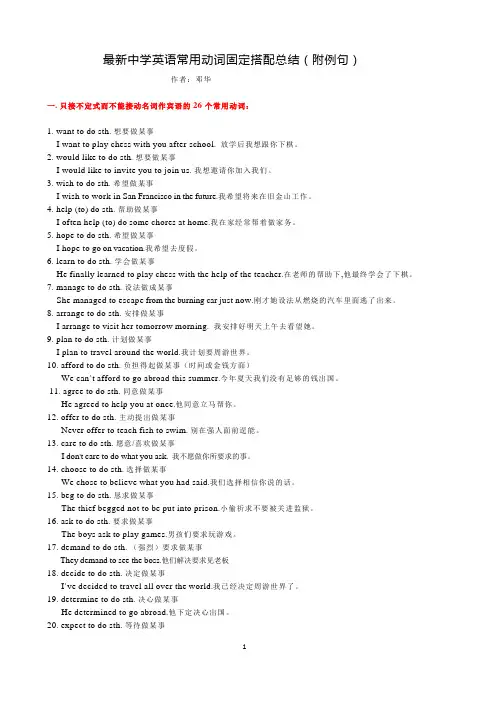
最新中学英语常用动词固定搭配总结(附例句)作者:邓华一. 只接不定式而不能接动名词作宾语的26个常用动词:1. want to do sth. 想要做某事I want to play chess with you after school. 放学后我想跟你下棋。
2. would like to do sth. 想要做某事I would like to invite you to join us. 我想邀请你加入我们。
3. wish to do sth. 希望做某事I wish to work in San Francisco in the future.我希望将来在旧金山工作。
4. help (to) do sth. 帮助做某事I often help (to) do some chores at home.我在家经常帮着做家务。
5. hope to do sth. 希望做某事I hope to go on vacation.我希望去度假。
6. learn to do sth. 学会做某事He finally learned to play chess with the help of the teacher.在老师的帮助下,他最终学会了下棋。
7. manage to do sth. 设法做成某事She managed to escape from the burning car just now.刚才她设法从燃烧的汽车里面逃了出来。
8. arrange to do sth. 安排做某事I arrange to visit her tomorrow morning. 我安排好明天上午去看望她。
9. plan to do sth. 计划做某事I plan to travel around the world.我计划要周游世界。
10. afford to do sth. 负担得起做某事(时间或金钱方面)We can`t afford to go abroad this summer.今年夏天我们没有足够的钱出国。
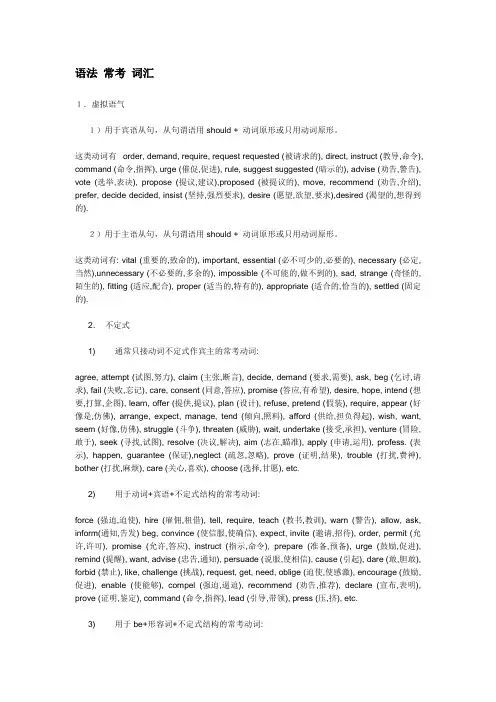
语法常考词汇1.虚拟语气1)用于宾语从句,从句谓语用should + 动词原形或只用动词原形。
这类动词有 order, demand, require, request requested (被请求的), direct, instruct (教导,命令), command (命令,指挥), urge (催促,促进), rule, suggest suggested (暗示的), advise (劝告,警告), vote (选举,表决), propose (提议,建议),proposed (被提议的), move, recommend (劝告,介绍), prefer, decide decided, insist (坚持,强烈要求), desire (愿望,欲望,要求),desired (渴望的,想得到的).2)用于主语从句,从句谓语用should + 动词原形或只用动词原形。
这类动词有: vital (重要的,致命的), important, essential (必不可少的,必要的), necessary (必定,当然),unnecessary (不必要的,多余的), impossible (不可能的,做不到的), sad, strange (奇怪的,陌生的), fitting (适应,配合), proper (适当的,特有的), appropriate (适合的,恰当的), settled (固定的).2.不定式1) 通常只接动词不定式作宾主的常考动词:agree, attempt (试图,努力), claim (主张,断言), decide, demand (要求,需要), ask, beg (乞讨,请求), fail (失败,忘记), care, consent (同意,答应), promise (答应,有希望), desire, hope, intend (想要,打算,企图), learn, offer (提供,提议), plan (设计), refuse, pretend (假装), require, appear (好像是,仿佛), arrange, expect, manage, tend (倾向,照料), afford (供给,担负得起), wish, want, seem (好像,仿佛), struggle (斗争), threaten (威胁), wait, undertake (接受,承担), venture (冒险,敢于), seek (寻找,试图), resolve (决议,解决), aim (志在,瞄准), apply (申请,运用), profess. (表示), happen, guarantee (保证),neglect (疏忽,忽略), prove (证明,结果), trouble (打扰,费神), bother (打扰,麻烦), care (关心,喜欢), choose (选择,甘愿), etc.2) 用于动词+宾语+不定式结构的常考动词:force (强迫,迫使), hire (雇佣,租借), tell, require, teach (教书,教训), warn (警告), allow, ask, inform(通知,告发) beg, convince (使信服,使确信), expect, invite (邀请,招待), order, permit (允许,许可), promise (允许,答应), instruct (指示,命令), prepare (准备,预备), urge (鼓励,促进), remind (提醒), want, advise (忠告,通知), persuade (说服,使相信), cause (引起), dare (敢,胆敢), forbid (禁止), like, challenge (挑战), request, get, need, oblige (迫使,使感激), encourage (鼓励,促进), enable (使能够), compel (强迫,逼迫), recommend (劝告,推荐), declare (宣布,表明), prove (证明,鉴定), command (命令,指挥), lead (引导,带领), press (压,挤), etc.3) 用于be+形容词+不定式结构的常考动词:anxious (担心的,渴望的), dangerous (危险的,不安全的), pleased (高兴的,满足的), hard , eager (热心的,渴望的), easy, fortunate (幸运地,侥幸的), strange (奇怪的,陌生的), good, ready (现成的,情愿的), usual (通常的), prepared, surprised (感到惊讶的), common (普通的,公共的), useless (无用的,), asked , lucky, difficult (困难的,艰难的), likely (可能的,), careful (小心的,仔细的), sure (确信的,一定的), glad (高兴的,愉快的), sorry (难过的,悔恨的), bored (无聊的,烦人的), able, free, quick, willing., determined, afraid. etc.4) 用于名词+不定式结构的常考名词:failure (失败者), offer (提供,提议), plan, ability (能力,才能), decision (决定,果断), desire(愿望,要求), chance, permission (许可,允许), occasion (场合,时节), fun (玩笑), honor (荣誉,尊敬), wish, pleasure, opportunity, demand (要求,需求), way, refusal (拒绝,推辞), responsibility (责任,职责), freedom (自由,自主), promise, etc.5) 后面跟省去“to” 的不定式作宾补的常考动词:see,watch, notice (注意,通告), observe (遵守,注意到), hear, listen to, feel (感觉,认为),get,make, have, let, help, know, look at, smell. etc.6) 表结果的短语+不定式:so…as to…, such…as to…, enough to…, only to…, too…to…3.动名词:1) 通常只接动名词作宾语的动词:admit (承认,接纳), appreciate (感激,评价), avoid (避免,逃避), delay (推迟,延误), deny (否认,), enjoy, finish, miss, postpone (推迟,延期), put off (拖延), practice, quit (离开,停止), suggest, keep, complete (完成,结束), anticipate (期望,预料), discuss, understand, favor(喜爱,帮助), escape (逃避,避免), forgive, consider, prohibit (禁止,不准), mind, dislike, can’t help(禁不住), risk, involve, imagine (想象), look forward to (期望,盼望), can’t stand (不能忍受), consider, ensure, excuse, pardon, give up (放弃), include, keep on (遵守), report, suggest. involve, etc.2) 常跟动名词作宾语的动词短语:approve of (赞成), insist on (坚持,强调), persist in, spend in ,engage in (从事), depend on, keep on, rely on (依靠,信赖), worry about, succeed in, give up, calculate on (计算), lead to(通向,导致), contribute to (有助于), devote to (献身,投入), object to (反对), look forward to, confess to (承认), concentrate on(集中于), focus on (使集中于), etc.3) 用于“名词+介词+动名词”结构的名词:pleasure in (以…为乐), opportunity of (…的机会), advise on (就…提出劝告), method for(…的方法), excuse for (…的借口), intention of (…的目的,意图), probability of (…的可能性), concern about (对…的关心), difficulty in (限于…的困境), trouble in (遇到…的麻烦), shortage of (…的不足), comment on (…的评论), importance of (…的重要性), necessity of (…的需要), approach to (接近/探讨…), etc.4) 用于“be+形容词+介词+动名词”结构的形容词:accustomed to (习惯于…), afraid of (害怕…), fond of (对…的喜爱), successful in (在某方面的成功), capable of (有…的能力), tired of (厌烦做某事), interested in, intent on (在某方面的打算), keep on, used to, good at, particular about (…的细节), bent on (致力于….), engaged in (从事于/忙于做某事), involved in (限入), devoted to (把…奉献给,专心于…),etc.5) 动词后可跟原形动词和动名词::+do/doingdiscover (发现,发觉), feel, find, force (强迫,迫使), get, imagine (想像,假想), etc..6)v.+sb. into doing:,动词有:cheat (欺骗), trick (欺骗,哄骗), deceive (欺骗), fool(愚弄), shame (侮辱),surprise(惊讶,吃惊), talk.etc.7)v.+sb. from doing,动词有:prevent, stop, keep, hinder(阻碍), restrain(抑制), save(拯救,节省[学位英语]词汇题答题技巧2009-07-13 18:15:17| 分类:英语词汇| 标签:|字号大中小订阅由于《大纲》强调要在语篇层次上解决语法与词汇问题,所以学位英语考试的这部分试题也很少是单个的句子,大多为并列句或复合句,因此我们也应学会根据语篇知识来掌握答题技巧,尤其是要注意句子之间的解释、对比、转折、因果等关系。
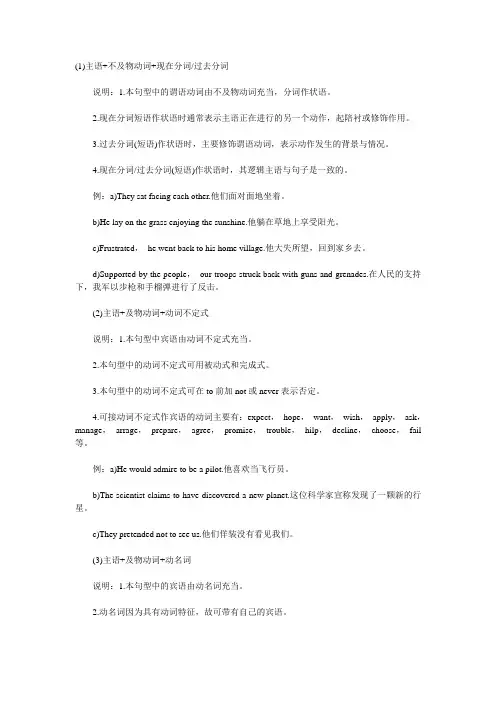
(1)主语+不及物动词+现在分词/过去分词说明:1.本句型中的谓语动词由不及物动词充当,分词作状语。
2.现在分词短语作状语时通常表示主语正在进行的另一个动作,起陪衬或修饰作用。
3.过去分词(短语)作状语时,主要修饰谓语动词,表示动作发生的背景与情况。
4.现在分词/过去分词(短语)作状语时,其逻辑主语与句子是一致的。
例:a)They sat facing each other.他们面对面地坐着。
b)He lay on the grass enjoying the sunshine.他躺在草地上享受阳光。
c)Frustrated,he went back to his home village.他大失所望,回到家乡去。
d)Supported by the people,our troops struck back with guns and grenades.在人民的支持下,我军以步枪和手榴弹进行了反击。
(2)主语+及物动词+动词不定式说明:1.本句型中宾语由动词不定式充当。
2.本句型中的动词不定式可用被动式和完成式。
3.本句型中的动词不定式可在to前加not或never表示否定。
4.可接动词不定式作宾语的动词主要有:expect,hope,want,wish,apply,ask,manage,arrage,prepare,agree,promise,trouble,hilp,decline,choose,fail 等。
例:a)He would admire to be a pilot.他喜欢当飞行员。
b)The scientist claims to have discovered a new planet.这位科学家宣称发现了一颗新的行星。
c)They pretended not to see us.他们佯装没有看见我们。
(3)主语+及物动词+动名词说明:1.本句型中的宾语由动名词充当。
2.动名词因为具有动词特征,故可带有自己的宾语。
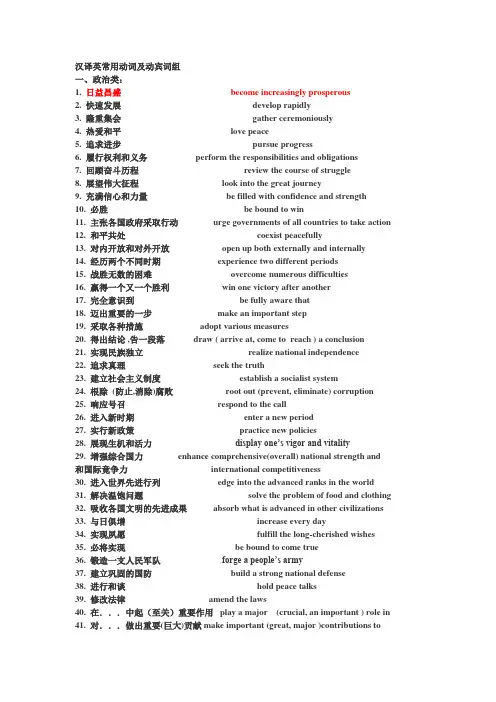
汉译英常用动词及动宾词组一、政治类:1. 日益昌盛become increasingly prosperous2. 快速发展develop rapidly3. 隆重集会gather ceremoniously4. 热爱和平love peace5. 追求进步pursue progress6. 履行权利和义务perform the responsibilities and obligations7. 回顾奋斗历程review the course of struggle8. 展望伟大征程look into the great journey9. 充满信心和力量be filled with confidence and strength10. 必胜be bound to win11. 主张各国政府采取行动 urge governments of all countries to take action12. 和平共处coexist peacefully13. 对内开放和对外开放open up both externally and internally14. 经历两个不同时期experience two different periods15. 战胜无数的困难overcome numerous difficulties16. 赢得一个又一个胜利win one victory after another17. 完全意识到be fully aware that18. 迈出重要的一步make an important step19. 采取各种措施 adopt various measures20. 得出结论 ,告一段落 draw ( arrive at, come to reach ) a conclusion21. 实现民族独立realize national independence22. 追求真理seek the truth23. 建立社会主义制度establish a socialist system24. 根除(防止,消除)腐败root out (prevent, eliminate) corruption25. 响应号召 respond to the call26. 进入新时期enter a new period27. 实行新政策practice new policies28. 展现生机和活力display one’s vigor and vitality29. 增强综合国力 enhance comprehensive(overall) national strength and和国际竟争力 international competitiveness30. 进入世界先进行列edge into the advanced ranks in the world31. 解决温饱问题solve the problem of food and clothing32. 吸收各国文明的先进成果absorb what is advanced in other civilizations33. 与日俱增increase every day34. 实现夙愿fulfill the long-cherished wishes35. 必将实现be bound to come true36. 锻造一支人民军队forge a people’s army37. 建立巩固的国防build a strong national defense38. 进行和谈hold peace talks39. 修改法律amend the laws40. 在...中起(至关)重要作用 play a major(crucial, an important ) role in41. 对...做出重要(巨大)贡献make important (great, major )contributions to42. 遵循规则follow the principles43. 把理论和实际结合起来integrate theory with practice …44. 把...作为指导take… as the guide45. 缓和紧张状况ease the tension46. 高举伟大旗帜hold high the great banner47. 解决新问题resolve new problems48. 观察当今世界observe the present-day world49. 开拓前进open up new ways forward50. 增强凝聚力enhance the rally power51. 结束暴力,开始和平谈判end the violence and resume peace talks52. 进行战略性调整make strategic readjustment53. 开始生效go into effect / enter into force54. 就...接受妥协accept a compromise on55. 接受...的采访be interviewed by56. 把……看成社会公敌look upon … as a threat to society57. 把……捐给慈善机构donate …to charities58. 维护世界和平maintain world peace59. 摆脱贫穷落后get rid of poverty and backwardness60. 实现发展繁荣bring about development and prosperity61. 反对各种形式的恐怖主义be opposed to all forms of terrorism62. 宣布。
成人本科学位英语常考短动词短语1account for 阐明(原因等);解释His unhappy childhood ____ his bad temper.(1997.6) A. counts for B. accounts for C. makes for D. goes fortake into account 考虑;重视I hope my teacher will take my recent illness into _____when judging my examination.A. regardB. accountC. countingD.observationI'd ______ his reputation with other farmers and business people in the community,and then make a decision about whether or not to approve a loan.A. take into accountB. account forC.make up for D. make outaccuse sb. of sth. 控告(某人某事)=charge sb. with sthThe customer accused the cook ____ using cannedpotatoes.A. forB. withC. ofD. againstThe soldier was ___________ of running away when theenemy attacked.A. scoldedB. chargedC. accusedD.punishedThe shop assistant was dismissed as she was ________ ofcheating customers .A. accusedB. chargedC. scoldedD.cursedaccustom sb to sth. 使某人适应某件事情=be accustomed to sth.=adapt sb to sthHe finds it difficult to _____ himself to the climate here.A. accountB. accustomC. applyD. adaptact on 按照…而行动You should act _____ the advice of your doctor. A. to B. on C. at D. astake advantage of 趁…之机,运用=make use ofSuch a skilled tennis player knows how to take ______of his opponent’s chief weakness.A. useB. advantageC. utility C. chance Her fluency in English gives her an advantage _____ othergirls for the job.A. aboveB. overC. thanD. withafford to (买)得起(某物);承担旳起We don't need air conditioning, _____.A. nor can we afford it C. neither can afford itB. and nor we can afford it D. and we can neitherafford itOnly those who can ___ to lose their money should makehigh-risk investments.A. maintain C. endureB. sustain D. affordallow for 考虑到Our trip takes two hours, but we should allow for delayscaused by traffic jams.apply for 提出申请(或规定等)He applied for a post to the college.apply...to 把…应用于We should apply what we learn in the classroon to thepractice.approve of 赞成,满意If only the committee _________ the regulations and put them into effect as soon as possible.A. approveB. will approveC. can approveD. would approveassist sb. with sth./assist sb. in doing sth 协助某人做某事He asked us to _____ them in carrying through their plan.A. provideB. arouseC. assistD. persistassure sb. of sth./that 使(某人)确信The manager assured the customer that his complaint would be seen __ A __ immediately.A. toB. atC. onD. withattend to 专心;照顾,护理pay attention to 注意;重视belong to 属于;附属In short,__ D __ he lives, a man belongs to some society.A. whateverB. wheneverC. whicheverD.wherevermake the best of 充足运用…care for ①喜欢;②照顾She doesn’t care for movies about violenceThe house was well cared for.catch on 理解,明白,变得流行I didn’t understand anything at first, but now I ambeginning to catch on.catch up with 赶上;指出…出了差错Aris was in hospital for two weeks, so she’s been working hard to catch up with the others.He spoke so quickly that I didn’t _______ what he said.(1992.6)A. receiveB. acceptC. listenD. catchcharge s.b with s.th=accuse s.b of s.th 指控某人犯有某种罪行charge: 要价Urban crowdedness would be greatly relieved if only the __C___ charged on public transport were more reasonable.A. feesB. paymentsC. faresD. costsThis hotel _____ $ 60 for a single room with bath.A. claimsB. demandsC. pricesD. chargeskeep company with 与…交往;和…亲热consult with 与…商议(协商)contribute to 有助于…,促成Medical research has shown that the widespread of use of cigarettes contributes _____ the increase of cancers.A. towardsB. forC. withD. toStudies show that the things that contribute most to a sense of happiness cannot be bought, __________ a good family life, friendship and work satisfaction.A. as forB. in view ofC. in case ofD.such asEating too much fat can heart disease and causehigh blood pressure.A. attribute toB.contribute toC. attend toD.devote toconvince sombody of something 使某人确信某事cope with 对付…,妥善处理count on 依托;期待,指望You can never____ that fellow for help at a criticalmoment.(1994.6)A. take onB. hold onC. count onD.hang oncut back 削减;缩减The factory’s production has been cut back.cut down 减少,减少We must cut down expense s or we’ll get into debt.cut off 切掉;切断They will cut the electricity off if you don’t pay the bill.cut out 切掉;删掉If you want to get thin you must cut out your fat.成人本科学位常考动词短语2英语词汇-03-27 21:03:02 阅读2070 评论0 字号:大中小订阅deal with 应付,处理There is no one here who can _____ the problem.(1994.6)A. see offB. treatC. deal withD. set updeal in 经营take delight in 以…为乐devote oneself to 献身于;致力于He devote himself to teaching and win the respects ofthe students.distinguish …from…把…同…辨别开It is important to ________between the rules of grammar and the conventions of written language.A. determineB. identifyC.exploreD.distinguishdo away with 废除,去掉It’s time to d o away with some old regulations.do without 没有…也行;将就If there is no bread, we must do without (it).draw a conclusion 得出结论drop by/in 顺便走访,非正式访问Why don’t you drop in and see me?bring into effect 实行,实现,实行come into effect 开始生效,开始实行take effect (药等)见效We are interested in the weather because it _____ us so directly ---- what we wear, what we do, and even how wefeel.A. benefitsB. affectsC. guidesD. effectsOnce out of the earth's gravity, the astronauts is _____ by the problem of weightlessness.A. affectedB. effectedC. inclinedD.relatedCritics believe that the control of television by massadvertising has ______ the quality of the programs.A. lessenedB. declinedC. affectedD.effectedend up 结束,告终;竖着end up with 以…而结束It is high time that such practices __________ .A. are endedB. be endedC. were endedD. must be endedensure sb. against 保护某人免受…equip with 装备,配置There is a fully ______ health center on the ground floor ofthe main office building.A. installedB. equippedC. providedD.projectedcatch sb.'s eye 引起(某人)注目keep an eye on 照看;留心In the experiment we kept a watchful eye ____ the developments and recorded every detail.A. inB. atC. forD. onface up to 勇敢地对付;大胆面向Eve is too young to face up t her parents’ divorce.fail to 不能,记忆She keeps a supply of candles in the house in case ofpower ______.A. failureB. lackC. absenceD. dropfall behind 落在…背面,跟不上His study falls behinds other students in his class.feel like 感到想要做Do you feel like going to a movie?figure out 计算出;估计;理解Helen figured out the answer.I can’t figure out what he intended to sa y.fill in /out 填充,填写,临时替代Have all the blanks been filled in?catch fire 着火,烧着do sb. a favour 给某人以恩惠The professor could hardly find sufficient grounds _______ his arguments in favour of the new theory.A. to be based onB. to base onC. which to baseon D. on which to basefocus...on 使眼睛注视,集中All her energies are __________ upon her children and she seems to have little time for anything else.A. guidedB. aimedC. directedD. focused成人本科学位英语常考动词短语3英语词汇-03-27 21:05:21 阅读1893 评论0 字号:大中小订阅set free 释放,使获得自由make friends with 与…交朋友make fun of 取笑,讥笑hang up 把…挂起来;挂断电话hang on (vi.) 坚持If you hang on, you’ll succeed.happen to 碰巧head for 朝…方向走去identify with 认为…等同于inform s.b of s.th告知某人某件事情Ten days ago the young man informed his boss of hisintention to ___.A. resignB. rejectC. retreatD. replaceThe manager promised to keep me _____ of how ourbusiness was going on.A. to be informedB. on informingC. informedD.informingWe desire that the tour leader ____ us immediately of anychange in plans.A. informB. informsC. informedD. has informed We regret to inform you that the materials you orderedare ____.A. out of workB. out of stockC. out of reachD.out of practiceThe president promised to keep all the board members of how the negotiations were going on.A. inform C. be informedB. informing D.informedtake interest in 对…感(产生)爱好Through out his life, Henry Moore _____ an interest in encouraging art in the city of Leeds.A. containedB. securedC. reservedD. maintainedplay a joke on sb. 开某人旳玩笑have no lack of 不缺乏lead to 通向,导致;引起=bring about=result inlet down 放下;减少;使…失望I was depending on Esther, but she let me down.let out ①放掉(水等);②泄漏(秘密)I’ll tell you a secret, but you mustn’t let it out.go beyond the limit 超过程度long for 渴望fall in love with 相爱,爱上…major in 专攻,专修name sth after sth 用…命名…object to…反对…to say nothing of 更不必说pass away 消失;去世;终止George’s mother passed away three months ago.pass by 走过;(时间)逝去pass on 把…传给他人Please pass on the secret word “water” to the nextperson.pay back 偿还(借款等);回报I owe you some money. Let me pay you back.pay off 还清(债款)Some families never pay their debts off.preserve sth from 保护…使…免遭=protect sth from=shelter sth fromprevent sth/sb from 制止(某物/某人)做某事=stop sth/sb from=keep sth/sb fromNot having a good command of English can be a serious _____ preventing you from achieving your goals.A. obstacleB. faultC. offenseD.distressThey took ________ measures to prevent poisonous gasesfrom escaping.A. fruitfulB. beneficialC. validD.effectivereact on 对…有影响react to 对…起反应refer oneself to 依赖,求援于refer to sb. /sth. as 把…称作rest in 存在于,由于Why do people work? The answer rests in the kind of pride that is stimulated by the job, by the activity ofaccomplishing.rest on 根据,信任I have been told that much of the knowledge does not rest on reasoning or on experiment, but on authority.rely on 依托,依赖,依仗remark on 评论,谈论,议论remind sb. of sth. 让某人想起了某事get rid of 挣脱,除去save up 储蓄;贮存;节省search after 探索;寻找send for 派人去请;召唤;索取The manager sent for me and asked for an explanation.show in 领入,领进来show off (vi. )炫耀,卖弄Do you like people who show off?show up (vi.) 出席,露面Only nine members showed up at the meeting.smell of 有…旳气味stand by 站在旁边;支持I am your friend. I’ll alw ays stand by you.stand for ①代表;②容忍(一般用于否认句)The sign“+”stands for plus.We cannot stand for such bad living conditions.stand in one's way 阻碍,阻碍stand out 突出,显眼,杰出She will stand out from the crowd because of her heightand her bright red eye.stand up for 维护;坚持“Stand up for what you believe” Roger told John.stay up 不睡觉,熬夜Father often stayed up working.stick to 坚持;忠于;信守I will stick to the principle and never break it.switch off (用开关)关掉switch on (用开关)启动talk over 商议,(充足)讨论We talked over the business before reaching theconclusion.tell...from 辨别,辨别;认出tell...apart 把…辨别开lose one's temper 发火,发脾气stand the test 经受住考验treat sb. as 把…待如;把…看作take turns 依次,轮番put to use 使用,运用come into use 开始被使用After being tested in many ways, this newly-designed machine will _____ in the near future.A. take its placeB. put into useC. come into useD. take actionuse up 用完,耗尽;花完=run out ofwork out 算出;设计出;制定出Father is still trying to work out his tax.We must work out a better method of saving water.work at 从事于,致力于Bob is still working at the new book.yield to…容忍,忍受We love peace, yet we are not the kind of people to yield________ any military threat.A. upB. toC. inD. at成人学士学位英语考试必备之介词短语2英语词汇-03-27 20:55:34 阅读2210 评论0 字号:大中小订阅at al times 总是,一直at best充其量at first sight 初见,乍见at leisure 闲暇时at a loss 不知所措at peace/war 与…友好/战争at times 间或。
2018年成人学位英语考试:动词的运用讲解既然这是个常见的错误,我们便要特别留意,并且记住下面这些指导原则:●动词和主语在人称和数目上要一致,如:①I am a writer.②Helen is an editor.③They have a good future.④Dr Chen teaches us English.⑤Some old houses were burnt to the ground.⑥A deserted hut has already been demolished.●两个或两个以上的单数主语由连接词and贯串起来时,便成了复数,动词也要复数,如:⑦David and Jason are colleagues.⑧The driver and the passenger were involved in a quarrel.●两个主语由with或as well as 等连接时,动词要和第一个主语的人称及数目呼应,如:⑨A woman with her puppies is walking along the lake.⑩The monitor as well as the other students has been scolded.●两个主语由eitheror或neithernor连接时,动词要和第二个主语的人称及数目呼应,如:11. Either you or your friend is wrong.12. Neither John nor his classmates have said it.●集合名词(collective noun)当整体看待时,动词是单数,如:13. The steering committee is made up of five members.14. The jury has made its final decision.有时可以个别看待集合名词里的成员,这时这些成员合起来便变成复数,动词也是复数了,如:15. The committee have met once and they will meet again next month.16. Despite hours of deliberations, the jury were still divided in their opinions.。
常见动词辨异1.accept接受(答应收下);receive收到;get得到(指经过努力)。
(accept + 抽象名词:invitation,plan,explanation等,receive十具体名词:letter, report cheque等)2.acknowledge (公开)承认;admit (勉强)承认;confess (对错误、罪)坦白3.accomplish;achieve;complete;fulfil;finish完成 accomplish 表示成功,强调完成的结果而不是过程,词源意义是“终于完成了”某事。
achieve完成,实现,达到(强调通过努力达到的目的)。
如:to achieve the desired resultcomplete完成,完结(表示积极的完成某个具体的事情)。
如:They have completed their task.fulfil履行,实现,完成。
普通用词语,意为完成使命,几乎与前面任何一词换用。
如:to fulfil a promisefinish完毕,结束,完成。
最常用语,后接v-ing,表示完成了最后的一步或阶段。
4.accuse;charge指控accuse谴责,指控,告发。
charge指控。
charge sb.for...向某人索取;charge sb.with指控某人(某罪)。
如:He charged me l00 dollars for mending the wall.to charge her with having stolen the ring5.acquire;require;inquire获得;需要;询问acquire取得,获得,学到(正式用语,通过自己不懈的努力才获得) 如:acquireknowledgerequire需要。
如:Automobiles require good roads.inquire访问,打听。
学位英语词汇4begin vt.开始at the beginning和in the beginningat the beginning 在…之初;在…开始的时候。
常与of连用。
如:Students usually have a study plan at the beginning of term. 学生们在开学初制定学习计划。
in the beginning 相当于at first,表示“起初、开始”时,含“起初是这种情况,而后来却不是这种情况”之意,不与of连用。
如:In the beginning,some of us took no interest in physics. 起初我们有些人对物理不感兴趣believe vt.相信【注意】回答问句时通常用I believe so/not的形式。
believe和believe inbelieve作及物动词时,其后可跟名词,表示相信的意思;后接从句时表示“认为”。
如:I don't believe his story.我不相信他所说的。
I believe he told us the truth.我认为他告诉我们的是真的。
believe in是一个动介型短语动词,这时believe是不及物动词,一起表示信任即trust 的意思。
如:She doesn't believe in God.她不信奉上帝。
besides prep.除……之外Beside和besidesbeside的意思是在……旁边。
besides的意思是除……之外(还),相当于in addition to。
如:There were three other people at the meeting besides Mr. Smith.与会的除了史密斯先生外,还有三人。
注: besides还可作副词用,解释为此外,而且。
如:I don't feel like dancing tonight. Besides, I will have an exam tomorrow.我今晚不想跳舞,再说我明天还要测验呢。
学位英语知识点复习资料【优秀4篇】一、词汇与语法篇1. 常用词汇积累(1)学术相关词汇:thesis(论文)、research(研究)、analysis(分析)、conclusion(结论)等。
(2)日常交流词汇:benefit(好处)、challenge(挑战)、solution(解决方案)、opportunity(机会)等。
(3)动词短语:account for(解释)、contribute to(贡献)、cope with(应对)等。
2. 关键语法点巩固(1)时态:熟练运用一般现在时、一般过去时、一般将来时、现在进行时等。
(2)语态:区分主动语态和被动语态,并能在句子中正确运用。
(3)非谓语动词:了解并掌握动名词、分词和不定式等非谓语动词的用法。
二、阅读理解篇1. 提高阅读速度(1)跳读:快速浏览文章,抓住主题和关键信息。
(2)精读:针对重要段落和细节,仔细阅读,理解文章内涵。
2. 策略性解题(1)事实细节题:直接在文章中寻找答案。
(2)推理判断题:根据文章内容和背景知识,进行合理推断。
(3)主旨大意题:把握文章结构,概括文章主题。
三、完形填空篇1. 培养语感2. 注意上下文联系在解题过程中,关注上下文之间的联系,尤其是代词、转折词等。
四、写作篇1. 提高写作能力(1)积累素材:多阅读优秀文章,学习写作技巧。
(2)模拟练习:针对不同题型,进行模拟练习。
2. 熟悉写作模板学位英语知识点复习资料【优秀4篇】三、听力理解篇1. 提升听力技巧(1)预测能力:在听前根据题目和选项预测对话或短文的内容。
(2)关键词定位:在听的过程中,关注关键词,如数字、专有名词等,以便抓住关键信息。
2. 培养日常听力习惯(1)多听英语广播、新闻、电影等,提高对不同口音和语速的适应能力。
四、翻译篇1. 掌握翻译技巧(1)直译与意译相结合:根据语境灵活运用直译和意译。
(2)词汇准确:确保翻译的词汇准确无误,符合原文含义。
常用动词和常用介词、副词的搭配abound with/in富于、充满……absolve sb.from 赦免某人的……abstain from 避开(免)……accommodate sb.with 向某人提供……accommodate oneself to 适应…… account for 说出(明)……原因accuse sb.of指责、控告某人……acquaint…with/of把……通知某人act for代理……act on对……起作用;按照……行动add up to合计达到……adjust oneself to使自己适应于……admit of容许有……advertise for登广告寻求、寻找……advise sb.of sth.把某事通知某人advise with sb.on sth.同某人商量某事agree with sb./to sth.同意某人、某事aim at瞄准、针对……allow for考虑到……,体谅……allow of容许,容得……amount to相当于、等于……answer for负责、保证……appeal to sb.for sth.为某事向某人提出呼吁apply to sb.for sth.请求某人……appoint sb.to任命、委任某人为……approach sb.on/about sth.为某事同某人打交道approve of对……满意argue with/against sb.about/on sth.与某人辩论某事argue sb.into/out of doing sth.说服某人做或不做某事arise from由……而产生、而引起arrange with sb.for/about sth.与某人商定某事ask for请求……;向……要……;通过询问找……assess on/upon向……征税、罚款assign…to把……分配给……assist sb.with sth./in doing sth.帮助某人做某事assure sb.of使某人确信某事attend to专心于……,注意……attribute…to把……归因(咎)于……avail oneself of利用……awake to认识到……awara…to把……授予(判给)……bang sth.into sb.硬把某事灌输给某人bargain on doing sth.商定做某事beg…of sb.请求某人……beg for乞求……believe in信任……belong to属于……belong in/with/……应归于某类别、派别等bid…to sb.向某人表示…… blame sth.on sb.把……归咎于某人blaze with sth.燃烧;闪耀着;激发……blow off吹掉;将热水、蒸气等放掉boil over发怒、激动borrow sth.from/of sb.向某人借……bother…about sb.为……烦扰bother about doing sth./to do sth.为做某事操心、烦恼break in闯入,打断break in on打扰、打断break off折断;突然停止讲话;断绝break out战争、火灾等突然发生break up打碎,破碎;分裂;学校期末分散bring about造成、带来…… bring sb.back to 使某人恢复到……bring in生产,产出;引进风尚等bring off使成功;完成……bring out使呈现出……;说出……bring through救活,使……渡过难关bring to使……恢复知觉build on依赖、依靠……;把……建立于……build up树立、逐步建立…… burst into闯入……;突然发作burst on/upon突然来到……calculate on/upon指望着……,期待着……call for需求、需要;为争取……而叫喊call off叫走……,把……叫开去call on约请、指派……;号召、呼吁……call up召唤、传讯……;使人想起……care for/about关心、担心、介意、计较……carry away运走、拿走……carry on把……进行下去;坚持下去carry out突现、开展……;执行、贯彻……cast about for寻觅……,想方设法cast away丢掉、抛弃……cast down使……沮丧;使下降cast off抛弃……;使……自由catch at死命抓住……;渴望取得……catch up with赶上、追上……caution sb.against doing sth.警告某人不要做某事cease from doing sth.停止做某事centre(…)on/upon(把……)集中于……challenge sb.to…向某人提出……挑战change…for…用……去换……;换车、船到……change…into…把……变成……charge sb.with sth.与某人交换、调换……charge sth.upon sb.把……归咎于某人cheat sb.of sth.骗取某人的……cheat sb.into…哄骗某人……check up核对……,检验……;检查……check up with与……相符合chew over/upon深思,细想choose…from/among/out of从……中挑选……claim sth.from/of sb.要求某人……clash into…猛撞在……clean out(把……)打扫干净、清除出去clean up(把……)收拾整洁,打扫干净clean up on击败……,胜过……clear off清除……;摆脱烦恼等;走开clear up整理、清除……;解除误会等climb down从……爬下;退让,服输、屈服close down工厂等关闭;(电台)停止播音close in包围……,迫近……close with靠近……,逼近……;接受……cohere with连贯、符合……combine…with……把……与……结合come about发生come at袭击……;达到、得到……come down in下来;降下;败落,没落come down on…(for…)(为……)向某人索要……come down to流传到……come down with出(捐)多少钱come in for接受遗产等;受到处分等come out of由……出来、产生come out with发表、公布……;说出、提出……come through经历困难等;经历……而活着come to(oneself)(昏迷后)醒过来;醒悟过来come up against碰到困难、反对等come up to达到、符合……come up with赶上……;提出……commend sth.to sb.把……交托给某人commend sb.upon his+n.表扬某人的……commit sb.to+v-ingb(phr.)把某人提交给……;责成某人做……commit sb.for把某人押交……communicate sth.to sb.把……通知给某人communicate with sb.by…用……和某人通讯compare…with…把……和……比较compare with…in…在……和……相比较compensate sb.for…因为……向某人赔偿complain of/about抱怨……;诉……苦;抗议……complain to sb.of sth.向某人控诉……compliment sb.on his+n.夸奖某人的……compromise with sb.on sth.在……和某人妥协conceal sth.from sb.对某人隐瞒……concede to sb.对某人让步concent rate(…)on sth.(注意力)集中在……concur with sb.(…)同意某人(的……) condemn sb.to判某人……刑罚conduct to道路通向……confer sth.on/upon sb.授予某人称号、学位等confer with sb.on/about sth.与某人协商……confess to+sth./v-ing(phr.)承认(做了)……confide sth.to sb.向某人吐露……confide in信任……confine…to把……限制在……confirm sb.in his+n.(在信念等方面)使……更坚定conflict with与……斗争、战斗conform(…)to/with与……一致、符合;使……遵照……confound…with…使……与……混淆connect with与……相连、连接、衔接consent to赞成、答应consign…to…把……委托给、交付给……consist of由……构成consist in存在于……consult with同……商量、协商contr ast(…)with(使……)与……对照contribute to/towards对……起一份作用、出一份力convert sth.into sth.把……转变、换成……convey sth.to sb.向某人传达感情等convict sb.of宣判某人有……罪cooperate with sb.与某人合作、协作cope with对付、妥善处理correlate to/with使……相互关联correspond to/with与……一致、符合count from…to…从……数到……count on/upon依靠、依赖……指望……cover sb./sth.with把……对准某人;用……覆盖……crash to/into猛撞在……;猛然倒下、坠落cross over to投到……来,投诚crowd…with persons/persons to…某处挤满了人cry for因……而叫喊、流泪cry over sth.为……而流泪、悲伤cure sb.of his+n.治愈某人某种疾病cut in插嘴;把……插进……cut off切掉、删去……;切断……;关掉马达等cut sb.to刺穿某人至……;伤害某人感情……deal with处理、安排……;对付、应付……debate about sth.争论某事deceive sb.into+v-ing(phr)骗某人去做……decide against+v-ing(phr)下决心不做……decide on决定、选定……declare(…)for(on)/against表态支持或反对……decorate…with sth用……装饰、装潢dedicate sth.to把力量、时间等用在……defend sb.from保护某人以免……deliver sb.from从……解救某人deliver sth.to sb.把……交付给某人demand sth.of/from sb.要求某人……depend on/upon…(for…)(为……)而依靠、依赖……deposit sth.with sb.把……寄放在某人处deprive sb.of sth.夺去、剥夺某人的……derive(…)from…(从……)取得……;由……而来design sth.for为……指定、预定……design sb.for打算让某人从事……despair of…丧失……信心detect sb.in(+v-ing)察觉某人在(做)……devote sth.to(+v-ing)把……专用于(去做)……dictate(+sth.)to sb.向某人口述(……) die of/from死于疾病等die for为……而死die away/out/down变弱;平息;消失等differ from sth.和……有区别、差别;和……不同differ from sb.on/about sth.在……与某人意见不同dig at sth.苦学……;苦干……dig for sth.搜集……dig out sth.掘出、挖掉……dilute sth.with sth.用……把……冲淡、稀释direct sb.to指引、指导某人到……disarm sb.of sth.解除、缴下某人的……discharge sb.from免除某人的……;允许某人离开……discourage sb.from+v-ing(phr)劝阻某人做……discredit sb.with使某人在……丧失信誉discuss sth.with sb.与某人讨论……disguise oneself by+v-ing(phr)通过做……掩饰自己dismiss sb.from开除、解除某人的……dismiss sth.from从……消除……dispute with/against sb.on/about sth.同某人争论、辩论……dissent from不同意……;和某人(意见)不一致distinguish sth.from sth.识别……和……distribute sth.to sb.把……分给某人distribute sth.over sth.把……散布于……divide…into…把……分成……divide…from…把……从……隔离开divide sth.with sb.和某人共同承担do away with废除、去掉……;弄死、干掉……do for sth.照管(应)……;设法弄到……;代替……do sb.down胜过某人do with sb.与某人相处doubt about/of sth.对……怀疑drag sb.into把某人拖进……drain sth.away/off排去……的水或其他液体draw away拉开、离开draw off脱去手套等;排去多余的水;撤退draw to向……移动;逼近draw with追上……dream of/about sth.梦到(见)……dream of+v-ing(phr)渴望、向往做……dream away/out/through因空想而虚度时间等drink sth.off/up/down把……一饮而尽drive away at sth.努力做……drive…into…把……迫使、驱使到……drop away/off(一个一个地)离去;逐渐减少drop in on sb.顺便走访某人dwell at/in留居、寓于……dwell on/upon细想、详细讲述……ease sb.of his+n.消除某人……ease off/up 减轻、放松eat away sth.继续吃下去;把……蚕食掉eat up把……吃完;耗尽……;吞灭……elect sb.to推选某人到某岗位eliminate sth.from从……把……排除掉、排出emerge from从……出现、形成empty sth.of sth.把……从……排空、倒空end in以……为结果end off结束……end up by/with最后以……结束endure to坚持到、忍耐到……enforce sth.on/upon/from sb.强迫某人……enlarge on/upon详述……ensure sb.from/against sth.保护某人免受……ensure to/for sb.sth.保证给某人、赋予某人……enter sb.at/for把某人送进……;使某人参加……entertain sb.to/with款待某人……;以……招待某人entreat sth.of sb.恳求某人……equip…for…为……装备……equip sth.with用……装备……escape from从……逃跑、逃脱;从……漏出、流出estimate for对……估价、估计evolve sth.from sth.由……推论出、引申出……evolve from…由……演化、进化而来examine sb.in考查某人的……examine into调查、细查……exceed in在……领先exchange sth.for sth.把……换成……exchange sth.with sb.与某人交换……exclude sb.from拒绝某人加入、进入……excuss oneself for his+n.为自己的……辩解excuss sb.for+v-ing.(phr)原谅某人做……excuss sb.from给某人免去……exert sth.on sb.对某人施加……exist on靠……生存、生活expect+n.+of sb.对某人寄予期望……expel sb.from从……驱逐、开除某人experiment on/upon用……做实验experiment with试验……explode with爆发、突发……explore for考察、勘探……expose sb.to使某人面临……extend sth.to sb.向某人致以……;向某人提供……extract sth.from从……中取出、抽出、榨出……face up to勇敢地对付……fail in+/v-ing(phr.)在(做)……失败fall in with同意……fall off下降;变坏;离开,叛离fall out争吵;结果如何;离队fall out of放弃习惯等fasten sth.on/upon sb.把罪名等强加于某人favour sb.with sth.赐与、给与某人……fear for sth.为某人的……担忧feed on sth.以……为食物、为能源feed sth.to…用……喂……feed…with…向……供给……feel for sb./sth.同情某人;摸索找某物feel like+v-ing(phr.)想要做……fight against/with向……斗争fight off击退……;竭力避免……fight with与……战斗、斗争figure on+v-ing(phr.)打算、计划做……figure on one's+v-ing(phr.)指望某人做……figure out at合计为多少钱fill(sth.)with用……(把……)填满、装满find sth.for sb.为某人找……find out找出、发现……;查明真相等finish up with以……结束;最后有……fit sb.to 使某人适应……fit in with适合、符合……;适应……fix sth.on/upon倾注感情于……;集中注意力于……flare out/up闪亮;突然发怒flow from来自……;是……结果fly into突发、忽发……fly up to向上飞到……fold about/round交叠、合拢fold up垮掉;放弃;倒闭fold up into折叠起来成……follow out贯彻、执行……;把……探究到底follow up把……探究到底follow up sth.with用继续行动等加强……的效果fool sb.into+v-ing(phr.)哄骗某人做……fool sb.out of sth.诈骗某人的……force sb.into+v-ing(phr.)强迫某人做……forgive sb.for+v-ing(phr.)原谅某人做的事frighten sb.into/out of+v-ing(phr.)使某人吓得做(不做)……furnish sb.with sth./sth.to sb.给某人提供……fuss about瞎忙于……gain on/upon跑得比……快;超过……gain sb.over把某人争取到自己一边gasp after/for热望、渴望……gaze at/on/upon/into凝视、注视、盯着……gat along/on过活,生活get along with和某人相处get away逃脱、离开get away with侥幸做成……;侥幸取走……get down on对……产生恶感;开始不喜欢……get down to开始认真对待、考虑……get off脱衣服等;下车等;使动身;使开始get on穿衣服等;上车等get on for接近于……get on to识破某人或某人的……get through with完成……;花光钱财等get to 到达……get up起床;使起立;登上……gift sb.with sth./sth.to sb.赠送……给某人give off发出蒸气、光等give sth.to sb.给某人……give up放弃……;停止……;抛弃……give up sth.to sb.把……让给某人glance at/over粗略地看一下……;对……一瞥glare at/on对……瞪眼,对……怒目注视glimpse at瞥见……go about+to-v-(phr.)着手干……go against违反、反对……;不利用……go back on/upon/from违背……;背叛……go by走过;依照、按照……判断go for为……去(请、找)……;被认为……go in at痛打……;猛烈攻击……go in for从事于……;酷爱、追求……go off with拿去……,抡去、拐走……go on继续下去(某种行为);发生、进行go over对……润色;再读一遍……go with和……一起去;与……持同一种意见graduate at/from从何处、何系毕业grasp at向……抓去;想抓住……grind sth.into把……磨成(得)……grow on(习惯、感情等)加深对……影响grow out of产生自……;变得不适合于……grow up(+into…)成长为……guarantee sb.against/from确保某人免于……grard against 警惕……guess at+that-cl推测出……guide sb.to带领某人到……gulp down一口吞下……;忍住、抑制住hand down把……传下来hand in把……交进、交上handle with(用手)搬运时要……hang on to紧紧握住……hang over挂在……上;靠近在……上hang up把……挂起来;挂电话happen to…某人某物出了事happe on/upon sb.巧遇、偶然发现某人hasten sth.to火速将……送到、调到……hasten to赶到……have sb.down/in/up把某人请来、请进做客(down:从城市请到乡下,up:从乡下请到城内) hear from接到某人的信hear of/about听说……hear sb.out听某人把话讲完help sb.with在……帮助某人help sb.off(on)with帮某人脱去(穿上)……help sb.out帮某人解决难题等hesitate about+v-ing(phr.)对做……犹豫不决hesitate at对某事犹豫hide sth.from sb.对某人隐瞒……hinder sb.from+v-ing(phr.)阻止、阻碍某人做……hinder sb.in妨碍某人的……hint at对别人暗示……hire on/out接受雇用hit off with适合于……hit out against sth.打击……的行为等hit out at sb.向某人打去;抨击某人hit sb.up for请求某人……hold back踌躇;阻止……;隐瞒消息等hold down压制……;缩减……;牵制……hold in约束……;抑制……hold off不接近,拖延;不使……接近hold out against对……不退让hold out for为……坚持住hold out till坚持到……时刻hold sth.over将……延迟hurry away/off匆忙离去hurry up赶紧identify oneself with参加到……中间去identify sth.with认为……和……一致idle about/along闲逛,无所事事idle away虚度时间、年华等illustrate sth.with用图来说明……immigrate into移民到……immunize sb.against使某人对……有免疫力impel sb.to促使、推动某人至……程度implore sb.for sth.为……恳求某人import sth.from从……进口……importune sb.for sth.向某人强求impress upon sb.sth.给某人在……留下强烈印象impress sb.with给某人留下……印象incline to倾向于……increase in增加、提高indispose sb.for使某人不能、不适应于……indispose s b.to使某人不愿、厌恶……infect…with sth.传染上、感染上……infer sth.from由……推论出inform sb.of sth.通知、告知某人……infuse sth.into sb./sth.赋于……某种东西infuse sth.with向……注入……inhibit sb.from+v-ing(phr.)禁止某人做……initiate sb.into使某人对……入门;使某人加入……inject sth.into把……注射到……innovate in/on/upon在……变革、创新inoculate sb.against给某人注射……疫苗inquire after问起某人的生活等情况inquire for询问地点等inquire of sb.about sth.问某人……insert sth.in/into把……插入……;登载广告等insist on/upon坚持……;坚决主张……inspire sb.to激励、激起某人到……程度inspire sb.with 鼓起某人的……insure…against 给……保……险integrate…with使……和……结合integrate sth.into使……并入……interact on相互作用、影响(于……)interest sb.in sth.使某人对……感兴趣interfere with打扰某人;与某事冲突、抵触intimidate sb.into+v-ing(phr.)胁迫某人做……introducesth.into把……引进、输入……introduce sb.to把某人引荐给……invest in投资于……investigate into对……进行调查invite sb.to邀请某人到……invite sth.from sb.征求某人的……isolate…from把……从……隔离开issue from从……流出issue in造成、导致……join in参加……join sth.to把……和……连结起来join sth.with使……和……结合、连结judge by/from以……判断judge of对……作评价jump at看到……时紧张、吃惊、喜悦而跃起jump for为(因)……而跳跃jump from…to突然从一话题跃到另一话题keep at坚持做……;不停地做……keep away站开;使离开keep…from(+v-ing)阻止、抑制……做……keep sth.from sb.对某人隐瞒……keep…in把……抑制住;隐瞒……keep in with不断讨好……;继续和……相好keep off不(使……)接近……;把……驱开keep on at纠缠、困扰某人;使某人烦恼keep on+v-ing(phr.)继续做……、进行下去keep out of使……置身于……之外keep up with 跟上、赶上……kick against/at反对、抗议……;对……发牢骚kill off消灭、杀光……kneel before/down/to跪下,跪着knit sth.into把……编成、编入……knock down把……击倒、击落;使屈服knock down for要求某人……knock(…)off把……打倒、击落knock under to向……屈服knock up against同……冲突;偶然碰见know about/of…知道、了解、懂得……;听说know…from区分……和……lag behind落后于……land…at把……送到……;使……到达land up at在……歇脚last out 坚持;耐久laugh at因……发笑;嘲笑某人laugh away用笑来驱除烦恼等laugh down用笑声打断……laugh over笑着谈论……launch sth.against sb.对某人发出命令、威胁等launch into投入……launch on/upon着手进行、开始launch sb.in/into使某人进入……lay aside把……放在一边;把……留在以后用lay down放下……;交出……;规定、制定lay off(+v-ing)把……搁在一边;放弃(做)……lay on加(惩罚、命令)于……;猛攻……lay on for为……组织、安排……lay out摆开……,展示……;安排、设置……lay to把(功、过)归于……lead to导致、引起……lead…(from…)to(从……)把……引到……lead sb.on+to v-(phr.)诱使某人做……lead up to渐渐引到某个话题leap from…to从……跳到……leap to迅速、立即做出……leap…over使……跃过……leap with因……跳、跃learn from向……学习learn of听说、听到……leave…alone不管、不理……;不要动……leave…behind留下、忘了带……;把……丢在后面leave off(+v-ing)停止(做)……leave out省去、略去……;不考虑leave over留下、剩下……;使……延期leave sth.(up)to sb.把……交付于某人leave sth.with sb.把……交给某人lend…to把……交给lend oneself to帮助……;屈从……let(…)down放下、放低……;使……失望let in让……进来;招致祸害等let sb.in for使某人遭到……let sb.into让某人进入……;让某人知道……let…off放掉蒸气等;对……从轻处罚let on to向……泄露秘密等lie about sth.to sb.就……对某人撒谎lie on/upon依赖……;压迫……lie sb.out of sth.从某人处骗取……lie under受到、蒙受……light up点燃……;照亮……;使……变亮limit…to把……限定在……line up排队link sth.with把……和……结合起来link up with与……连接起来、联系着listen in to收听、监听……listen to留神听……live by靠……生活live off住在……之外;靠……供养live on以……为主食;继续活着live through度过、经受住……live up to实践誓言等;做到……;与……相等live with sb.与某人同居;和……住在一起lock sb.in/out把某人锁在……内或……外lock sth.away把……锁藏起来look after关心、照料……look at看、查看……;考虑、着眼于……look back to/up回顾……look down on/upon看不起……look for寻找……;期待……look forward to…/v-ing盼望(做)……look in(on sb.)顺便去看(某人)look on sb.with以……看待某人look on with sb.和某人合读、合看……look out(+for…)留心、当心、提防look through看穿……look to照管、看管……;留心、注意……magnify onese lf against sb.抬高自己而反对某人make away离去、逃去make away with携……而逃;摧毁……;浪费……make do with用……设法对付……;凑合着用……make for有利于……;倾向于……;冲向make from/of用……制造……(from为原材料) make in干涉别人;加入纷争make into把……制成……;使……转变为make off with携……而逃make out书写、填写……;把……说成……make up补偿、赔偿……;配制……;组成make up with sb.和某人和解make with作出、产生……;用(手、眼等)做动作manage with/without有、没有帮助能处理……manufacture sth.from/into 用……制成match…against/with使……与……较量、比赛mature into成长为……measure up to符合、达到……meet up with偶尔碰见……meet with遇见、碰见……;遭受mention to sb.+that-cl对某人讲起mistake…for把……错认为……mix sth.with sth.用……和……混合在一起mix up搅匀、搅和……;混淆……motion to sb.+to-v(phr.)向某人示意做……move off离去、走掉move to搬家、迁移到……nod sb.…向某人点头示意……notify sb.of sth.将……通知某人object to+sth./v-ing(phr.)反对(做)……obstruct sb.in/from+v-ing(phr.)阻挠某人做……occupy oneself with sth./in+v-ing(phr.)某人正忙于(做)……occur to sb.某人想到……open into/on/onto 通往、通向……open out打开、展开……;开发……;表明open to sb.某人看见了……;展现在……operate on/upon sb.for对某人的某疾病开刀operate(sb.)on为某人某部位动手术operate to对……起作用oppose…to使……和……相对抗;用……反对……overflow with充满了……,洋溢着……owe…to sb.欠某人的……;把……归功于某人owe sb.for因为……而欠某人(的……)own to+v-ing(phr.)承认做了……own up to爽快地承认……pack sb.off 叫某人卷铺盖、解雇某人pack with某地方挤满了人;……塞满了东西parallel…with把……与……比较pardon sb.for+v-ing(phr.)因做……请某人原谅part from/with sb.同某人分手、告别part with sth.使……与……分离、分开participate in参加、参与……participate with sb.in与某人分享、分担……pass sth.on sb.对某人提出批评、宣布判……刑pass sth.to sb.把……传给某人pass through穿过、经过……pause on在某方面、某点停止(暂停)pay down用现金支付pay for偿还……;受到……报应pay off付清某人的工资、债务等pay sth.to sb.向某人表示问候;访问某人等permit of容许某事persuade sb.into+v-ing(phr.)说服某人做……persuade sb.out of sth.劝某人取消persuade sb.to sth.劝某人使其同意……phone(sth.)to sb.给某人打电话(告诉他……) pick out挑出、选出……;区别出……;领会……pick over在……挑选;分档挑选出……pick up拾起、捡起……;偶然获得知识、信息等pick up on与……熟悉起来place sth.on/in sb.对某人寄予希望、信任plan on+v-ing(phr.)打算做……play along with参与……;与……合作play at做游戏;参加比赛等;做事敷衍了事play at sb.in sth.用……和某人开玩笑、嘲弄某人等play out把戏演完、比赛进行到底play on/upon不择手段地利用……play upon to在演戏中和……配合得好;迎合……plug in把塞子、插头塞入、插进……point/at/to/towards指着、指向、面向……、暗示……point out指出……possess sb.of sth.使某人占有、具有post…over with在……上面贴满了……pour out涌出……;倾吐、诉说……practise at开业做(医生、律师等)practise in练习……practise upon/on欺骗某人;利用某人的缺点等praise sb.for sth.某人因……而受到赞扬等pray for sb.为某人祈祷pray for sth.请求某人的……pray sb.for sth.向某人恳求某事precede sth.by/with为……加上前言、引言prepare for为……准备prepare sb.for sth.使某人对……有所准备prepare sth.for sth.为……准备、预备……prescribe for/to给……命令、指示;为……开处方present sb.to sb.引见某人见……present sb.to sb./sb.with sth.送某人……preside at/over主持会议等press(+sb.)for强迫某人……press(+sth.)on sb.把……强加于某人prevail on/upon/with sb.+v-ing(phr.)劝说、说服、诱使某人做……prevail over胜过……prevent sb.from+v-ing(phr.)阻止某人做……print sth.on使……牢记在……proceed against sb.for sth.为……而对某人起诉proceed from从……开始、着手;出自于profit by/from从……中得益;利用……prohibit sb.from+v-ing(phr.)禁止、阻止某人做……pronounce on对……发表意见pronounce…on sb.宜判某人……propose to sb.向某人求婚protect…from保护……以免……provide for为……而准备;为……提供生计provide sth.for为……提供……provide sth.with为……装备……provoke sb.into+v-ing(phr.)激起、惹得某人……pull about把……拖来拖去;粗暴地对待pull away脱身、离开pull down拉倒;摧毁……;使……精神不振pull off脱衣等;努力实现……pull out拔出……;撤走……;渡过难关等pull sb.through使某人渡过困难、危机等pull sth.on sb.拔出刀、枪等对着某人pump sb.for sth./sth.out of sb.从某人处探出……purchase…with用鲜血、牺牲、生命换得……push around把……推来推去;烦扰、欺侮……push on to努力向……推进、前进push on with加紧于工作、学习等push sb.on促使某人继续做下去push sb.over把某人推倒put about使……转向;散布……;麻烦……put aside把……放在一边;储存……以备后用put…by把……放在旁边;回避、忽视put down放下……;拒绝……;镇压……;记录……put…down at/for估计……;认为……put…down to把……记在某人账上put forward放出……;提出计划、理论等put in放进……;使……就职;种植……put off推迟……;搪塞……;脱掉……;扔掉put sb.off使某人失去……;使某人分心等put out放出、伸出……;生产、发布……;熄灭……put sb.on to引起某人对……的注意put sb.through使某人经受考验、训练put up举起……;进行……;推举……;建造……put upon欺骗……;使……成为牺牲品put up with忍受……;容忍讨厌的人或事puzzle…about/over对……为难、窘困qualify sb.for sth.使某人对工作、职务等合格quarrel with sb.和某人吵嘴、争吵quarrel with sth./sb.埋怨、责备……question sb.on sth.就问题等而询间某人race with sb.与某人赛跑rage against/at对某人某事大发脾气raise sb.from使某人从……站起、起来raise sth.to sb.向某人举起……range from…to从……变动到……(在……与……之间变动)reach for伸手取、拿……read about/of谈到、获悉……read out 宣告开除……;读出……read sth.through把……从头读到尾reason sb.into sth./v-ing(phr.)劝说某人做……reason sb.out of sth./v-ing(phr.)劝说某人不做……reason with sb.against/for为反对或赞成……和某人评理recall sb.to使某人想起了……receive sth.from sb.得到某人的……receive sb.into接受某人加入……recommend sb.for介绍、推荐某人加入……recommend…to把……托付给……recompense sb.for补偿某人的……recover from从……状态下恢复、复原reduce…to把……减少到……refer to谈到、提到、涉及……refer…to把……归于……;认为……是……的起源reflect on/upon思考、考虑、沉思……refrain from+v-ing(phr.)忍住、抑制住做……reinforce…with沉陷于……relate to和……相处relate…to/with使……与……联系;显示……与……的关系relieve sb.from消除某人的……relieve…of使……解除了、消除了苦痛等remark on/upon谈论……remember sb.to sb.代……向……致意、问好remind sb.of使某人想起、记起……remove sb.from从……把某人开除;撤某人的职render sth.to向……做汇报等rent at/for租金多少钱rent sth.to/from租(房子等)给……;向……租……repay sb.for报答某人的……repeat sth.to把(别人讲的话)传给……replace…by/with用……取代、代替reply to 回答、回复……report of说出对……的印象report on/upon报告、汇报某事report to向……报到represent sth.to向某人描述、描绘、讲述……reproach sb.for/with 为……指责、申斥某人request sth.from sb.向某人要求……request of sb.恳求、请求某人……require of sb.要求、命令某人……rescue sb.from从……处、状况下营救某人research into调查、探究……reserve sth.for为……保存、储蓄……reside at/in住在……resign from辞去……职务resign…to把……交付、托付给……resign oneself to屈服于、陷入……resolve sb.upon+v-ing(phr.)使某人决心做……resort to 求助、凭借respond to响应……;对……有反应rest on视线停留在……;搁在……;依赖rest with取决于……;归于……restore sb.to使某人恢复到……restrain…from+v-ing(phr.)制止、遏制……做……result from由……而产生、引起result in引起、导致……retire from从……退职、引退、隐居等retreat from放弃……;从……退出return from从……回来return to归还给……;话题等回复;恢复职务reward sb.for为……而答谢某人ride in/on乘、坐、骑……ring…about/in/round包围、围拢……ring for按铃、摇铃叫或要……rob sb.of sth抢劫、劫掠某人的……root in扎根于……root…out/up根除、清除、肃清……rouse sb.(up)from使某人觉悟;唤醒某人rouse sb.for为……而唤醒某人rub along一起过日子;两人以上勉强地相处rub away 擦去、磨去……rub down用力擦遍……;把……擦亮rub off 擦去、消除……run through勉强通过……rule out排除、取消、拒绝考虑……run down跑下;用完……;人筋疲力尽;健康逐渐变坏run in跑进来;顺便探访run into使……撞在……;偶然碰见某人run off使……逃跑;从……流掉;进行试验等run out跑出;完成……;突出、伸向……run out of用完……run through跑着穿过……;匆匆看过……;挥霍……run up against意外地碰到困难、遇到某人run up to跑到……;把……积累到……rush at/on/upon冲向、奔向……rush into/out of冲入、出……;闯入……rush into/to仓促地……sail for船开向……sail into船驶进……save sb.from把某人从……救过来save sth.for为……而节省,节约钱、时间等say sth.in用某种语言说、讲……scare…away/off把……吓跑scare…out of sb.把某人吓得要死scream for为……而尖叫search for搜寻、探查……search into研究、调查……search out寻找、找到……seat oneself at/in/on在……边、里、上坐下secure…against掩护、保护……以便secure sb.from保护某人以免……secure…with用……保护、用……使其安全see about查看、查询……see after照应、照顾……see into调查、了解……的性质、意义等see sb.off为某人送行see sb.through关心、帮助某人使渡过难关等see sth.through使……顺利通过;把……进行到底see to负责、注意……see with同意……seek after/for寻找、寻求、探索……seek out 搜寻出……;在……中挑出……seize sb.by抓住某人的……select…from从……中选出……sell at/for出售几个/多少钱卖sell up卖光……send…along发送、派遣……send away把……送往远处;驱逐……;解雇……send for派人去叫……;遣人去拿……send out发送、派遣……;放出……send over运送、发送……send…to派遣……去、到……sensitize sb.to sth.使某人对……有所察觉sentence sb.to判某人……徒刑separate…from…把……和……分开、分离set about开始、着手……;散布谣言……set against使……得到补偿、平衡;和……对立set aside留出、拨出……;略去……set down放下……;使……下车;记下、记入……set off出发、动身;使……爆炸;引起……set sb.off+v-ing(phr.)使某人开始做……set up竖立……;创办、开办……;提出……settle down to安定下来专心于……settle with和……取得谅解;与……清算;偿还……sew up缝合……shake off抖落……;摆脱……;撵走……shake out把……抖干净,抖开……shake sth.from从……把……抖掉shame sb.for使某人为自己的……而羞愧shame sb.into/out of+v-ing(phr.)使某人感到羞愧而做或不做……share sth.with sb.和某人分享……shelter sb.from掩护某人以免……shine up to sb.百般讨好某人shine with因……而发亮、发光。
Break off: (使)分离;(使)脱离;停止;断交We may break off relations with that country. 我们有可能和那个国家断绝关系。
Romola's heart swelled again, so that she was forced to break off. 罗摩拉的心又强烈激动起来,以致不得不突然停住不说了。
Break out: (战争、打斗等不愉快事件)爆发,突然发生Armed conflict may break out at any moment. 武装冲突有一触即发之势。
Disagreement reached such a pitch that we thought a fight would break out. 意见分歧达到我们以为会争吵起来的程度。
Break through: 突围,突破;猛涨;攻破It was quite some time before they break through the enemy's blockade. 他们花了好长时间才冲破敌人的封锁线。
This very successful effort did not result from break through of technology. 这种具大的成果并不来源于工艺上的突破。
break up: 结束;(使)破碎;放假;(使)散开the break-up of their marriage 他们婚姻的破裂The workers will break up the old cars for their parts. 工人要把那些旧车拆掉取零件。
bring about: 使(船)掉转船头;造成,引起[导致](某事);创造;实现Several circumstances concurred to bring about the result. 几种情况合在一起导致了这个结局。
They conspired to bring about the meeting of the two people. 他们共同促成了两人的会面。
Bring down: 降(价);把(某物,某人)抬下(楼、山);使(某物或某人)掉下[倒下];击败…At the next vote, we must try to bring down the government. 下次选举时,我们一定设法击败政府。
First bring down his temperature. 先给他退热再说。
Bring forward: v. 提出,提前,显示;套圈;转账We'll bring forward the matter at the next conference. 我们将在下次会议上把这事提出来。
And we bring forward some about several other questions. 并对一些问题提出了一些看法Bring out: 出版;取出(某物);呈出(某物);说出…It's warm enough to bring out the garden chairs. 天气很暖和,可以把花园用的椅子搬出来了。
It did not take the police, long time to bring out the truth. 警察没用多长时间就获悉了事情的真相。
Bring over: 把(某人)带回…;说服(某人)改变主意I told him to bring her over here today. 我让他今天就把她带到这儿来。
When are you going to bring the rest of your family over? 你准备在什么时候把你家里其余的人接过来?Bring into effect: v. 实行;实施;使生效;实现They have already begun to bring their plans into effect. 他们已经开始实施计划。
Bring into play: 发挥We must bring all positive factors into play. 我们必须调动一切积极因素。
Arouse baby's imagination so bring into play creativity during actual operation. 激发宝宝想象力,从而让宝宝实际操作过程中发挥创造力。
Carry out: 执行;进行;完成;抬出去Make sure the firm is competent to carry out the work. 要确保这家公司有能力完成这项工作。
to carry out random spot checks on vehicles 对车辆进行抽检carry over: 使持续下去;推迟,延期The group agreed to carry over their discussion on the topic to the next meeting. 小组同意把该问题的讨论推迟到下次会议继续进行。
Carry on: 经营;<非正>继续进行;争吵;吵闹Only one carry-on is allowed. 随身只能携带一个小包。
Please carry on as usual while I am away. 我不在时,请照常干活。
We must try to carry on as if nothing had happened. 我们必须继续下去,只当作什么都没有发生过。
Come about: 发生;改变方向In a few minutes he had come about into her seat. 几分钟后,他已经过来,坐在她的身边。
What has come about? 发生了什么事?Come around: 苏醒;周而复始;造访;开始接受Why don't you come around and see us one evening? 你何不找个晚上过来看看我们?I think he'll come around eventually. 我认为他最终会回心转意的。
Don't expect too much of me.I need time to come around to this new idea. 不要对我期望太高。
我需要时间接受这一新思想。
Come into force: 开始生效The regulations come into force as of today. 本条例自即日起施行。
Come into play: 积极活动,起作用All your faculties have come into play in your work. 在你的工作中,你的全部才能已起到了作用。
The new rules have already come into play. 新规则已经开始生效。
Come on: 开始;快点;前进;开始工作Come on, lazybones, get up! 赶快,你这懒骨头,起床了!Come on, it's time we left. 快点,我们该走了。
Come out: 出来;出现;出版;出狱The boss alerted him that thief might come out at night. 老板要他提防夜里可能有贼。
4. It's been a long year, but he will come out next Friday. 这一年真长啊,但他下周五要出狱了。
Come to: 苏醒;到达;共计;突然想起When he came to and raised his head he saw Barney. 他苏醒过来,抬起头,看见了巴尼。
I've come to the conclusion that he's not the right person for the job. 我断定他不适合做这项工作。
His ancestors had come to America from Ireland. 他的祖先从爱尔兰来到美国。
Come up: 开庭to come up before the magistrates 在地方法院出庭come up to: 达到;将近;来到近旁;比得上Your behavior does not come up to the expected standard. 你的举止达不到要求。
The book doesn't come up to the mark. 这本书没达到标准。
Veronica had come up to him with her usual cheery smile. 维罗妮卡带着她一贯的愉快笑容来到他跟前。
Come up with: 追赶上;比得上;想出;准备好(钱等)What's our fallback if they don't come up with the money? 要是他们拿不出钱,我们如何应变?I hope you can come up with a better plan than this. 我希望你们能提出一个比这个更好的计划。
Cut down: 裁短;减少;把…砍倒We're trying to cut down on the amount of paperwork involved. 我们正在努力降低有关此事的文书工作量。
The axe is too blunt to cut down the tree. 斧头太钝,砍不倒树。
Cut in: 插嘴;干预;突然插到…前面;允许加入I think I ought to cut in on what they are doing. 我想我应该对他们所做的事情进行干预。
I would like to be cut in on this project. 我愿意加入这个项目。
I was enjoying the dance until that rude man cut in. 我正跳得高兴,却被那鲁莽的男人打断了。
Cut off: 切除;切[隔]断;剪[切,砍]下;The government announced a cut-off in overseas aid. 政府宣布停止对外援助。